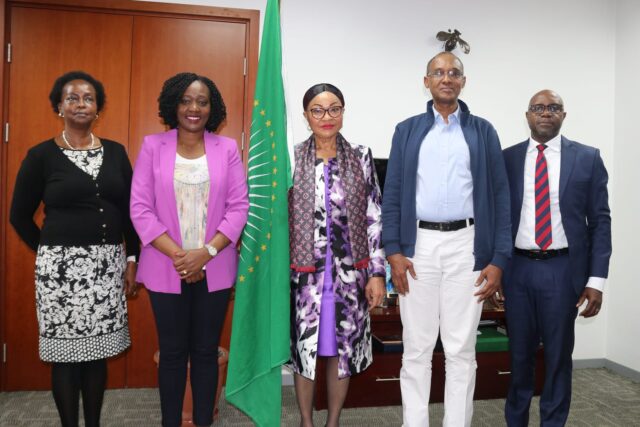Debt distress among most African countries is impeding the continent’s ability to engage in proper adaptation and mitigation activities, Environment, Climate Change and Forestry Cabinet Secretary Soipan Tuya has said.
Speaking at the African Union Commission (AUC) ahead of the African Ministerial Conference on the Environment (AMCEN) the Cabinet Secretary said that spending on debt repayment, “debt distress that leaves very little or no capital for African countries to engage in climate change related action,” she said and added that, “the inaugural African Climate Summit is the first time that the African Union has called for a conversation on Climate Change.
The Cabinet Secretary who fielded questions from journalists across the continent noted that previous attempts including the Paris Agreement has not succeeded in reducing greenhouse gas emissions, “international meetings on climate change have done very little to reduce greenhouse gas emissions which are rising by the day,” said Soipan.
The Cabinet Secretary said that recent reports by the Intergovernmental Panel on Climate Change (IPCC) show that carbon emissions are increasing and the world is not on track in keeping temps below the 1.5 degrees Celsius as agreed under the Paris Agreement.
She noted that the Africa Climate Summit will be able to show the immense resource potential that the continent has as part of the solution to combating climate change. “The renewable energy potential that range from solar, hydro, and Wind energy, is immense and can offer the solution to fossil fuel driven development,” said Soipan.
The continent boasts the largest arable agricultural land, the Cabinet Secretary said, “and if properly exploited can feed the whole world with least emissions of greenhouse gases.”
She noted that the immense Carbon sinks provided by the forests and virgin soils provide potential for Carbon sequestration, “Africa will be urging the world to bring capital that is adequate, equitable, timely and at scale to match these resources, as we move the world towards a green growth and a low carbon development pathway so as to decarbonizes and combat climate Change.”
She said that the African Climate Summit will provide an opportunity for partnerships where African and the world are offered trade and investment opportunities, in ways that ensure sustainable development.
The Commissioner for Agriculture Rural Development, Blue Economy and Sustainable Environment Josefa Sacko said climate change is a reality and Africa is the most affected by the impacts. She called for budgetary allocation for climate action among countries noting that, “if African heads of state meeting in Maputo in 2003 passed a resolution requiring that countries allocate 10% of their national budgets to agriculture to boost food security, we must find ways of financing efforts to curb climate change,” she said a press conference held at the African Union Commission.
Sacko urged African states to end dependence on foreign funding and instead utilize local resources adding that lack of unity is the undoing to African driven efforts, “CAADP is not working due to disunity, let us work together on the climate front.”
While calling for a change in the development matrix on the continent, Ambassador Sacko noted that climate change has had a knockout effect on Africa’s development and continues to subject more and more Africans into hunger and malnutrition, stunting and poverty.
She said the global climate agenda is not favorable for Africa, arguing that dependence on foreign loans is driving Africa into the abyss, “if we look at the interest rates charged on the loans given to Africa, they are charged at 7% yet the gross domestic product growth rates remain at below 2% when will such countries ever come out the debt trap?” she wondered.
Ambassador Adekunle King of Sierra Leone called for imposition of environmental tax on multinational companies that are carrying out mining operations and activities in different countries, “we should increase the knowledge of public sector workers on what is available in the countries before signing contracts, when they come to negotiate there what we call knowledge asymmetry” he said and added, “they know more about what is in the ground than you the government, so we mortgage our resources.”
While calling for structures that ensure intergenerational equity trust funds, Ambassador Adekunle noted that, this will ensure there are sustainable development practices, “we can provide scholarships for children from the areas where mining is taking place to help lift such people from poverty.”
He urged for putting in place of policies that deal with the restoration and decommissioning of mining areas that ensure that such areas are transformed into an ecosystem that is productive.
Among the issues to be addressed at the Africa Climate Summit will be championing the Green Growth Agenda and Climate Finance plan, presenting transformative partnership opportunities, and attracting new finance and investment.
The summit’s outputs will serve both Africa’s and the world’s ambitions for climate action, focusing on five core growth drivers, including: –
Just Energy Transition/Renewable Energy with key priorities being encompassing and expanding electricity access, ensuring clean cooking availability, enhancing energy efficiency, and exploring renewable energy possibilities;
Green Minerals and Manufacturing which is being seen as key to Africa’s transition to a low-carbon and circular economy;
Sustainable Agriculture, Land, and Water and Ocean Use by recognizing agriculture as a pivotal driver for Africa’s green growth, explore broad political and financial support for sustainable agriculture initiatives, showcasing validated agricultural innovations for investor engagement
Sustainable Infrastructure and Urbanization investment in public transport infrastructure, focusing on practical options such as bus rapid transit (BRT) systems and e-mobility solutions as well as resilient or clean cities;
The summit will also be looking at how the continent can benefit from the Natural Capital found in Africa’s rich biodiversity as well as promote conservation, restoration, and sustainable use of biodiversity for sustainable development.






















